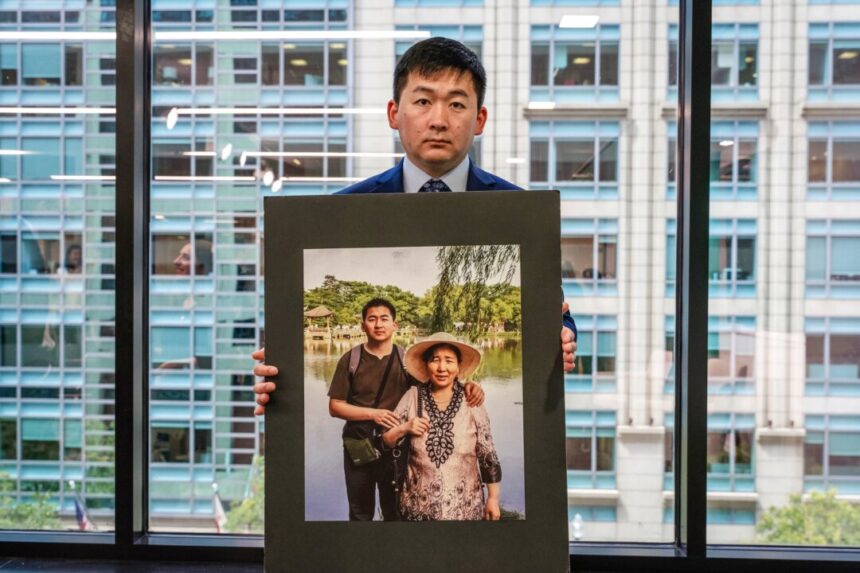Florida marine scientist Sherwood Liu noticed something was wrong when friends from out of state started messaging him.
“Do you know this guy?”
Liu was not familiar with the man.
However, the alleged spy, who worked at an international information technology firm, might be familiar with Liu.
Regardless of whether it was him or not, the arrest served as a reminder of how the Chinese Communist Party (CCP) keeps tabs on dissidents, even those overseas like Liu.
As the news sank in, Liu felt compelled to confront the man.
“We are dealing with the CCP, there is no rule of law,” Liu emphasized.
Top Target
Falun Gong was once widely practiced in China, but in 1999, the communist regime launched a brutal campaign to eradicate the spiritual movement, turning its followers into enemies of the state.
“They want to eradicate Falun Gong from the face of the earth and not just from China,” she added.
There are implications for the United States as well.
Operating ‘In the Dark’
Having left China in 1992, Liu believed he was free from the regime’s reach, only to realize a few years later that he was mistaken when a crackdown on Falun Gong began.
As a U.S. citizen and a Falun Gong practitioner, Liu faced harassment and surveillance from CCP operatives, even in the United States.
His experiences underscore the CCP’s global efforts to suppress dissent and control beliefs beyond its borders.
The official insisted on setting up a call with Liu. During the call, the official mentioned meeting in the United States and watching Liu do Falun Gong exercises in the park. He even took photos of Liu, claiming to know a lot about his activities. The official tried to persuade Liu to return to China, calling him a valuable talent that the country needed urgently. He offered to cover all travel expenses if Liu agreed to go back. When Liu refused, the official changed his tone and issued a warning, implying that if Liu continued speaking out against the regime, his brother’s career and children’s education could suffer.
The threats made by the official seemed to have had an impact. Liu noticed that his brother’s career stagnated, as he was never promoted and remained in the same position at a state-run airline until retirement. Liu suspected that this was due to his brother being deemed untrustworthy by the CCP, possibly as a result of the official’s interference.
Despite facing these challenges, Liu still feels uneasy about being monitored so closely, especially since the alleged Chinese spy is based less than an hour away from his city in Wesley Chapel. He worries about how many more Chinese agents could be nearby, acting as informants for the regime.
Liu emphasized the stark contrast between their open actions and the covert operations of Chinese agents, highlighting the fear and uncertainty that comes with being under constant surveillance.
Furthermore, the systematic data collection by Chinese authorities adds to the concerns of dissidents like Liu. Apps like WeChat gather user data aggressively, which can be accessed by intelligence authorities. The state maintains files on individuals, tracking their activities and collecting information that can be used against them at any time.
The crackdown on Falun Gong practitioners extends beyond China’s borders, with reports of U.S. citizens facing passport confiscation and arrest upon returning to China. The regime’s ability to retrieve information on individuals, even those who have been abroad for years, allows them to make threats and exert pressure on dissidents.
Additionally, leaked documents reveal the extent to which Chinese officials spy on overseas Falun Gong practitioners, collecting personal data and social networks to create personalized strategies for suppression.
The story of New York architect Simon Zhang illustrates the lengths to which Chinese authorities go to monitor and intimidate dissidents. Zhang’s mother faced persecution for her faith, and even after her death, Chinese police continued to target Zhang and his family, demonstrating their intrusive surveillance tactics.
The emotional toll of such persecution is evident in Zhang’s account, as he grapples with the loss of his mother and the relentless pressure from Chinese authorities. The Chinese regime’s ruthless tactics, including surveillance and intimidation, create a sense of helplessness and fear among dissidents like Zhang and Liu. 尽管中国当局很容易联系到他,但他与中国的亲人之间的距离几乎是无法逾越的。他说,他努力不给他们额外的压力,不让他们处于要么说服迫害者改变主意,要么逃跑躲藏的境地。“感觉就像你必须自我审查,因为你不想给中国的人带来麻烦,”他说。他指出,这正是政权希望他感受到的方式。他说,这是政权有效地让像他这样的异见者在国外保持沉默的方法。在街头的仇恨在威胁失败时,暴力往往会介入。2002年,作为南部美国法轮大法协会负责人的Sean Yang正在休斯敦中国领事馆前打坐抗议中国的迫害,当一辆车从领事馆的另一侧绕过来。有人从窗户里向他扔鸡蛋,然后飞车而逃。他的白衬衫上沾满了蛋斑。“显然是出于仇恨,”出生在台湾的杨告诉《大纪元》。他说,“他们敢在美国这样做实在太无耻了。”在同一条人行道上,辛西娅·孙小时候看到领事馆员工从设施中走出来,直接走到打坐者面前,从一英尺的距离拍摄他们的面孔。
这似乎是在传达这样一种信息,“尽管生活在美国,尽管在这里长大并成为公民,但中共总是在看着,老大哥总是在那里,”现在是法轮大法信息中心的研究员的孙在最近的哈德逊研究所活动上说道。美国政府最终指出休斯敦领事馆存在问题。2020年7月,特朗普政府下令关闭了该网站,称“美国不会容忍中华人民共和国侵犯我们的主权和恐吓我们的人民。”威胁以许多形式出现。2008年,在纽约法拉盛社区,200多名中国人经常挥舞着红色共产党旗帜,连续几个月参与一场活动,对法轮功学员进行吐口水、咒骂和肉体攻击。在活动的高潮期间,世界调查法轮功迫害组织调查并抓获了纽约中国总领事彭克宇,在录音磁带上承认他在煽动这些袭击中的角色。康在为自由之家研究时,住在距离法拉盛几个地铁站的地方,于是决定在一个周末下午去看看。很快,她看到有人在尖叫反法轮功的宣传并传播仇恨文献。过马路时,她看到另一群五到八人围着并嘲笑一个法轮功学员。她感到震惊,几乎怀疑自己是否在中国。她为受害者感到难过。有些人可能刚刚逃离了中国的迫害,来到美国寻求自由。“他们走在街上,只是穿着一件有关法轮功的T恤”,“他们面对这些仇恨袭击。”在其他城市和国家,包括澳大利亚、日本和加拿大,类似的场景也在小规模上演出。然而,攻击只是北京在全球进攻中的冰山一角。更令研究人员担忧的是,党如何操纵美国人来为其背水一战。法轮大法信息中心的一份新报告援引了三名有权访问政权内部信息的告密者的话,揭示了一场前所未有规模和复杂程度的活动。该活动的目标是播下公众不和,并有可能引发美国执法部门对法轮功的回应。其中一些策略包括激励社交媒体影响者和西方媒体传播中共公安部收集到的虚假信息,尤其是针对神韵艺术团。 The classical Chinese dance company based in New York, founded by Falun Gong practitioners, portrays ancient Chinese culture before communist rule and scenes of human rights abuses in modern-day China. According to a leaked document from a Chinese state-run think tank in July, there are instructions on how to actively defame Falun Gong in overseas media and suppress its internet traffic. The CCP has used various methods to advance its agenda in the United States, including economic activities, diplomatic relations, civil exchanges, and cultural activities. In some instances, Chinese officials have attempted to influence U.S. lawmakers to discredit Falun Gong instead of addressing serious human rights issues such as forced organ harvesting. Some individuals, unknowingly manipulated by the CCP, have been used as spies or sources of information against Falun Gong. The CCP has also infiltrated the American education system, influencing textbooks and policies to promote its agenda and suppress dissenting voices. This influence has led to incidents where individuals who support Falun Gong have faced backlash and discrimination. The CCP’s efforts to control the narrative and silence dissent extend beyond China’s borders, impacting individuals and institutions in the United States. The report found that many Falun Gong practitioners at universities expressed concerns about facing stigma from their Chinese peers or faculty members. Chinese student associations on college campuses in the US often report to local Chinese consulates or embassies, forming part of Beijing’s overseas influence network. This network, described as a “proxy,” carries out the regime’s agenda. The CCP employs adaptive authoritarian tactics to suppress Falun Gong and other targets, using incentives and rewards to maintain its persecution machinery. The regime exports its repressive strategies abroad, adjusting tactics and schemes as needed. The CCP’s offensive perspective and holistic defensive approach are crucial for countering Beijing’s influence. In China, individuals endure police harassment and fear, prompting them to speak out against persecution. The threat from Chinese hackers targeting individuals in the US underscores the need for vigilance and action against CCP interference. The stories of individuals like Zhang and Liu highlight the importance of standing up for those who lack a voice in the face of oppression. Please rewrite this sentence. Can you please rewrite this sentence for me? Please rewrite the following sentence:
“The cat quickly ran across the room and jumped onto the couch.”
“The feline swiftly dashed across the room and leaped onto the sofa.” Please rewrite this sentence.
Source link





